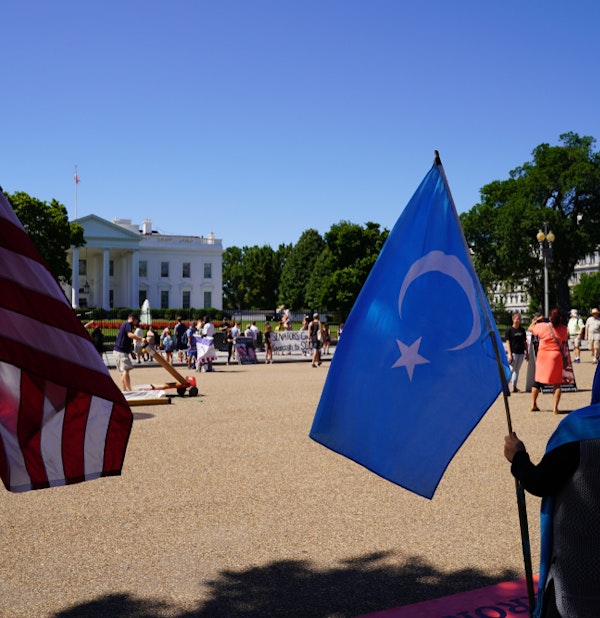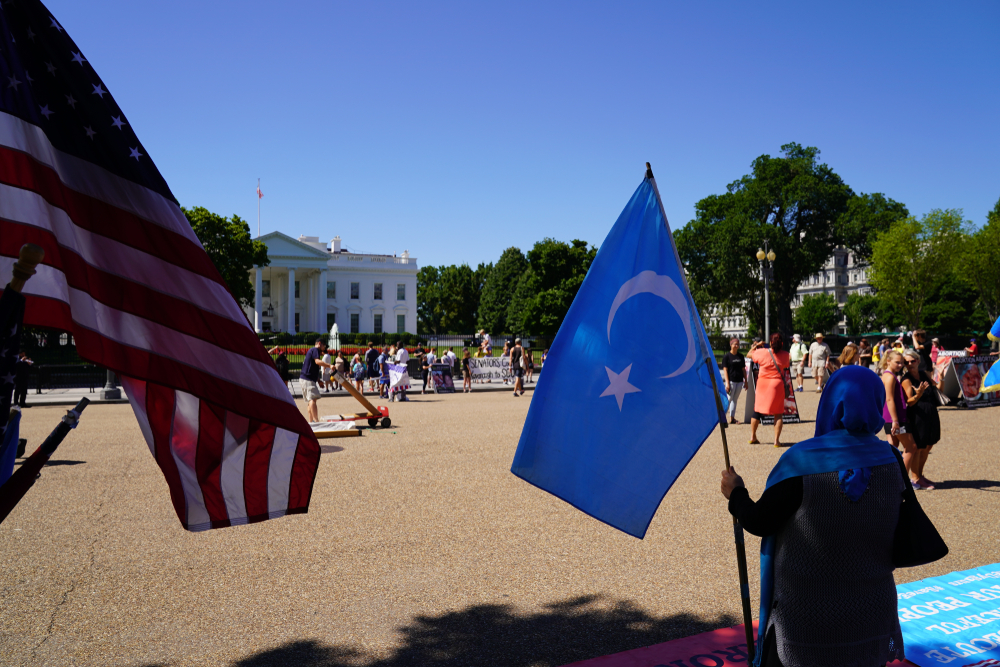China’s high-tech genocide
Beijing is wiping out the Uyghurs – yet Washington and its allies are sitting on the sidelines.
 Muslim elements demonstrated in the Uyghur defense at the Zero Point in Yogyakarta in December 2018. (Shutterstock/Ika Hilal)
Muslim elements demonstrated in the Uyghur defense at the Zero Point in Yogyakarta in December 2018. (Shutterstock/Ika Hilal)
China’s campaign to erase the culture and identity of Uyghurs and other Turkic Muslims has left millions voiceless. Under President Xi Jinping, the Chinese government is determined to eliminate the Uyghurs’ distinct ethnic and religious identity from the face of the earth. To do so, Beijing has launched a systematic and multifaceted campaign involving the use of many cruel and technologically sophisticated methods. Since 2017, between 2 million and 3 million Uyghurs and other Turkic Muslims have been detained by the Chinese government. Under the misleading term “reeducation” and the guise of fighting terrorism, extremism, and separatism, the government has used organized systems of torture, sexual violence, and forced labor to strip Uyghur prisoners of their humanity. At least 800,000 children have been separated from their families, and they may never be reunited.
Although international legal experts and numerous Western governments – including the United States – have determined that these abuses amount to genocide and crimes against humanity, accountability remains remote. With the active genocide now in its seventh year, the international response has come far too late and remains far too little.
As the West has stood by, the Chinese government has enslaved tens of thousands of Uyghurs to work in prisons and factories where, for little to no pay, they produce goods for export. These goods include raw materials, such as cotton and polysilicon, that are then incorporated into finished products, such as clothing, footwear, and solar panels. Many U.S. and other Western companies, including multibillion-dollar brands such as Adidas, Apple, and Nike, have been found to be complicit in this slave-labor system through their Chinese suppliers. Home Depot’s luxury faux wood flooring, which is used in homes, schools, and office buildings, is made with PVC from Xinjiang. Other companies are even more directly involved: Volkswagen and Coca-Cola run factories in the Uyghur region and operate joint ventures with state-owned enterprises that participate in the genocide.
U.S. corporations don’t just have a moral duty to avoid such practices: Under the 2021 Uyghur Forced Labor Prevention Act, they have a legal one as well. Enforcing the law has proved difficult, however, and many corporations continue to profit from Beijing’s abuses. Companies, however, aren’t the only ones to blame. In the name of maintaining relations with Beijing, many Western governments have also tolerated and ignored China’s human rights abuses. By failing to take decisive action, the United States and its allies have allowed China to corrupt global supply chains, Western education systems, and even democratic politics. This hands-off approach must end. Placing human rights at the heart of U.S. foreign policy is vital – not just to the safety of the American population but to U.S. democracy and national security.
 President Gerald Ford signing the Final Act of the United Nations Conference in Helsinki, Finland in January 1975 (Photo Courtesy of U.S. National Archives)
President Gerald Ford signing the Final Act of the United Nations Conference in Helsinki, Finland in January 1975 (Photo Courtesy of U.S. National Archives)
See no evil
For too long, the U.S. government has maintained a cordial relationship with the Chinese government for the sake of diplomacy. Engagement has not magically moderated the Chinese Communist Party’s corrupt and brutal system, however, and it never will. Preserving a polite U.S.-China relationship only makes it easier for Beijing to misbehave.
Just consider how decades of willful ignorance have permitted the Chinese government to steal critical Western technology and infiltrate the United States’ national security infrastructure. This year’s spy balloon incident was only the latest high-profile U.S. surveillance attempt by Beijing. In 2015, state-sponsored Chinese hackers penetrated the U.S. Office of Personnel Management and stole the security clearance files of 22 million Americans. That same year, China also gained access to the medical records of nearly 80 million U.S. citizens. And Beijing has appropriated a wide variety of intellectual property from U.S. corporations, including weapons blueprints and solar panel infrastructure.
American complacency has also enabled Beijing’s domestic repression. In recent years, the Chinese government has deployed a strict surveillance system that monitors its citizens’ communications and search histories and blocks access to foreign internet sites. Online criticism of the government and references to religion, among many other things, are banned. Indeed, according to Freedom House, China has become the world’s worst abuser of internet freedom.
Washington must act – for the sake of the Uyghurs, all Chinese citizens, the U.S. population, and that of its allies. The United States is a country of conscience with values that are a key source of its strength. The world, moreover, does not organize itself; it looks to the United States for leadership. The U.S. government must therefore be persistent and coherent in its messaging, always making it clear that it prioritizes human rights and will not be mollified by meaningless verbal commitments that do nothing to change the behavior of a genocidal regime.
Washington must act – for the sake of the Uyghurs, all Chinese citizens, the United States and its allies.
Some foreign policy experts argue that the United States can do little to change the way China treats its own citizens and that Washington must prioritize other goals. But the history of the Cold War shows how effective the U.S. defense of human rights can be. More than 70 years ago, when the Soviet dictator Josef Stalin tried to extend communist control over West Berlin by blockading the city’s road, rail, and water routes – leaving West Berliners without food, fuel, and medicine – the United States worked with the United Kingdom to airlift desperately needed supplies. Ten months of continuous pressure from Allied forces coerced Stalin into lifting his blockade. By defending the basic human rights of German citizens, the United States reestablished the status quo and revealed Stalin to be an international bully.
The 1975 Helsinki Accords further affirmed the United States’ position as a leader in human rights by emboldening Soviet dissidents to speak out against the authoritarian regime. Born into a country that explicitly targeted his Jewish heritage, Natan Sharansky faced job discrimination and political abuse and spent nine years in a forced labor camp due to his outspoken criticism of Soviet rule. Before the United States intervened, Sharansky and his fellow dissidents were fighting a losing battle against a government that used all means available to repress individual freedoms. But the Helsinki Accords allowed Sharansky, along with 10 other dissidents, to form the Moscow Helsinki Group to hold their government accountable for its international commitments to human rights and transparency. As Sharansky noted in 2004 testimony to Congress, “For the first time, the USSR’s international standing was linked to the regime’s treatment of its own citizens.”
 A farmer sows cotton seeds in a field on April 23, 2022 in Hami, Xinjiang Uygur Autonomous Region of China. (Photo by Sun Jihu/VCG via Getty Images)
A farmer sows cotton seeds in a field on April 23, 2022 in Hami, Xinjiang Uygur Autonomous Region of China. (Photo by Sun Jihu/VCG via Getty Images)
In the last 15 months, Russian President Vladimir Putin has attempted to regain lost Soviet territory by waging war on Ukraine – hoping to erase its identity and independence in the process. President Putin has used forced deportations, torture, sexual violence, and summary executions to try to break Ukrainians’ will to fight. By all accounts, President Putin expected a rapid victory. But thanks in large part to help from Washington – which, since January 2021, has invested more than $36.4 billion in security assistance to Kyiv – Ukraine has resisted. And the United States, in the process, has once more proved itself to be a world leader in the fight against evil.
Now Washington should show a similar resolve on behalf of the Uyghurs.
Naming and shaming
As a signatory of the Genocide Convention, the United States has a treaty obligation to call out, stop, and punish genocidal regimes. The Trump and Biden Administrations properly labeled Beijing’s campaign against the Uyghurs a genocide and a crime against humanity. Yet China’s bloody campaign continues. Not only will failing to act more forcefully harm the Uyghurs but it will also set a dangerous precedent and encourage other bad actors to commit similar crimes.
A proper U.S. response would start with Washington using its leverage to influence the lending and spending of multinational corporations and banks with ties to China and its genocide. Sen. Marco Rubio, a Republican from Florida, and members of the Congressional-Executive Commission on China have already urged Thermo Fisher, a company that markets scientific instruments and chemicals, to stop all sales to China. But it and other large corporations are unlikely to terminate their lucrative relationships with Beijing unless they are compelled to do so.
Congress has the power to end such private sector complicity. And it wouldn’t need to look far to develop the right legislation. Using the framework of the Foreign Corrupt Practices Act of 1977, Congress can reference existing U.S. laws to clearly define and denounce grave human rights violations. And it should pass a new law that addresses jurisdictional issues for domestic and foreign companies enjoying access to U.S. securities markets and that places enforcement decisions in the hands of prosecutors. The law should also compel companies to conduct internal investigations, report unethical business practices to authorities, create business and human rights due diligence programs, and foster a corporate culture that prioritizes ethical business practices. Elected officials must also pass bills that ensure full enforcement of the Uyghur Human Rights Policy Act. All Chinese tech giants that are sustaining the genocide must be sanctioned.
Respect for human rights and religious freedom is not solely a moral obligation; it is also key to protecting our economic and security interests.
Holding accountable all those involved in supply chains also necessitates updating the 2021 Xinjiang Supply Chain Business Advisory. The advisory was issued before the enactment of the Uyghur Forced Labor Prevention Act and should be reissued to clarify the reputational, economic, security, and legal risks facing entities that engage in human rights abuses. It should also include a call to action for Western technology companies to ensure their algorithms and platforms are not empowering the Chinese surveillance state and its genocide. Finally, the advisory should draw attention to America’s reliance on critical minerals and other essential supply chain components that are mined or processed in the Uyghur region.
Because China’s abuses cannot effectively be checked by the United States alone, Washington must engage in intense diplomacy with countries hosting Uyghurs who qualify for safe refuge in the United States. This list includes Turkey, Malaysia, Thailand, and the Central Asian states. Coordination with these governments is critical for resettlement processing and securing commitments to refrain from sending Uyghurs back to China under pressure from Beijing.

Keeping safe
China’s genocide against the Uyghur people has deployed many new tactics, and the world’s tools for preventing atrocities have not kept up. Yet history has consistently shown that states that brutalize their own citizens eventually brutalize others.
Fifty-five years ago, China’s leader, Mao Zedong, built reeducation camps to indoctrinate intellectuals and bureaucrats who failed to prove themselves sufficiently loyal. During this period, my mother was arrested and imprisoned in a detention center, where she was forced to praise Mao. It was in this bleak place, without access to sunlight or proper sustenance, that I was born. As the United States and others stood by, meanwhile, Mao’s regime would also go on to threaten total nuclear war, endangering millions of lives in China and abroad. The lesson is clear: a government that imperils its own people will eventually, inevitably, do the same to others.
The West risks making the same mistake today with President Xi. His China is far more technically sophisticated – and therefore dangerous – than Mao’s ever was. By ignoring countless warning signs and continuing to engage with corrupt leaders, the United States has emboldened them to commit the abuses that we are currently seeing. Respect for human rights and religious freedom is not solely a moral obligation; it is also key to protecting our economic and security interests. If the U.S. government wishes to safeguard those interests, it must act forcefully. Failing to do so will endanger us all.
The Catalyst believes that ideas matter. We aim to stimulate debate on the most important issues of the day, featuring a range of arguments that are constructive, high-minded, and share our core values of freedom, opportunity, accountability, and compassion. To that end, we seek out ideas that may challenge us, and the authors’ views presented here are their own; The Catalyst does not endorse any particular policy, politician, or party.


